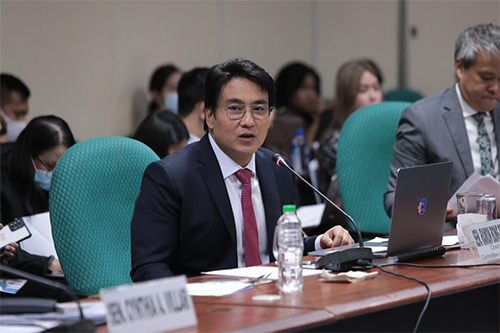Former first lady Imelda Marcos did not “institute” the flood control tax of 1972, contrary to what Sen. Ramon “Bong” Revilla Jr. has claimed.
A 25-centavo “special metropolitan flood tax” was imposed on all admission tickets of movie houses in Metro Manila under Presidential Decree (PD) No. 18, a law signed by then president Ferdinand Marcos Sr. more than two weeks after he declared martial law on Sept. 21, 1972.
STATEMENT
During a joint hearing by the Senate committees on public works and environment, natural resources and climate change on Aug. 9, Revilla, chair of the Committee on Public Works, said:
“As early as the 70s, no less than our president’s mother, madam Imelda Marcos, the mother of Sen. Imee [Marcos], acknowledged the problem of flooding in our society. She even instituted the flood control tax, collecting 25 centavos for the sale of movie tickets during the golden age of Philippine cinema, when the ticket booths were flocked by the public.”
Source: Senate of the Philippines, Committee on Public Works, Aug. 9, 2023, watch from 28:41 to 29:12
FACT
The 25-centavo flood tax was imposed for 15 years under PD 18, signed on Oct. 7, 1972 by then president Ferdinand Marcos Sr. The law created the Metropolitan Manila Flood Control and Drainage Council composed of the secretary of Public Works and Communications and the 14-member Metropolitan Mayors Coordinating Council.
Revilla may have confused the flood control tax with a separate 25-centavo fee, also sourced from movie ticket sales, which was implemented as a “cultural development tax (CDT)” in 1982 under Imelda Marcos’ term as Metro Manila governor. A WE Forum report from the same year shows that the flood control tax was still in place alongside the CDT.
The MMFCDC which was tasked with “formulating and implementing an integrated flood control and drainage program” for what is now known as Metro Manila or the National Capital Region.
Prior to the closure of both houses of Congress following the declaration of martial law on Sept. 21, 1972, Marcos Sr. certified as urgent a Senate bill creating an integrated flood control and drainage program for the Greater Manila Area.
The Metropolitan Mayors’ Coordinating Council (MMCC) sponsored the bill after a record-breaking 20 days of rain across Luzon in July of that year.
PD 18 merely adopted the flood control measures proposed by the pre-martial law MMCC.
“The council and flood tax were clearly not proposals emanating from either head of the conjugal dictatorship,” according to the Marcos Regime Research Group of the UP Third World Studies Center.
In 1979, Executive Order No. 546 attached the MMFCDC to the then newly created Ministry of Public Works.
Greater Manila Area residents voted in a Feb. 27-28, 1975 referendum to restructure four cities and 13 municipalities under the jurisdiction of the MMFCDC, creating the Metropolitan Manila Commission (MMC).
With Imelda acting as governor of Metro Manila, the MMC was tasked with coordinating a metro-wide flood control program. Imelda was not a member of the MMFCDC.
Collection of the flood control tax was mandated for 15 years under PD 18. When it was due to lapse in 1987, the flood and drainage council and the Ministry of Public Works were reorganized into the Department of Public Works and Highways.
Editor’s note: This article was produced by a journalism student of the University of the Philippines Diliman as part of their internship at VERA Files.





